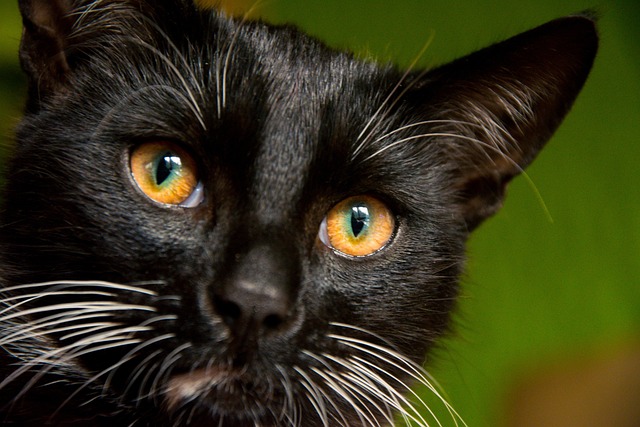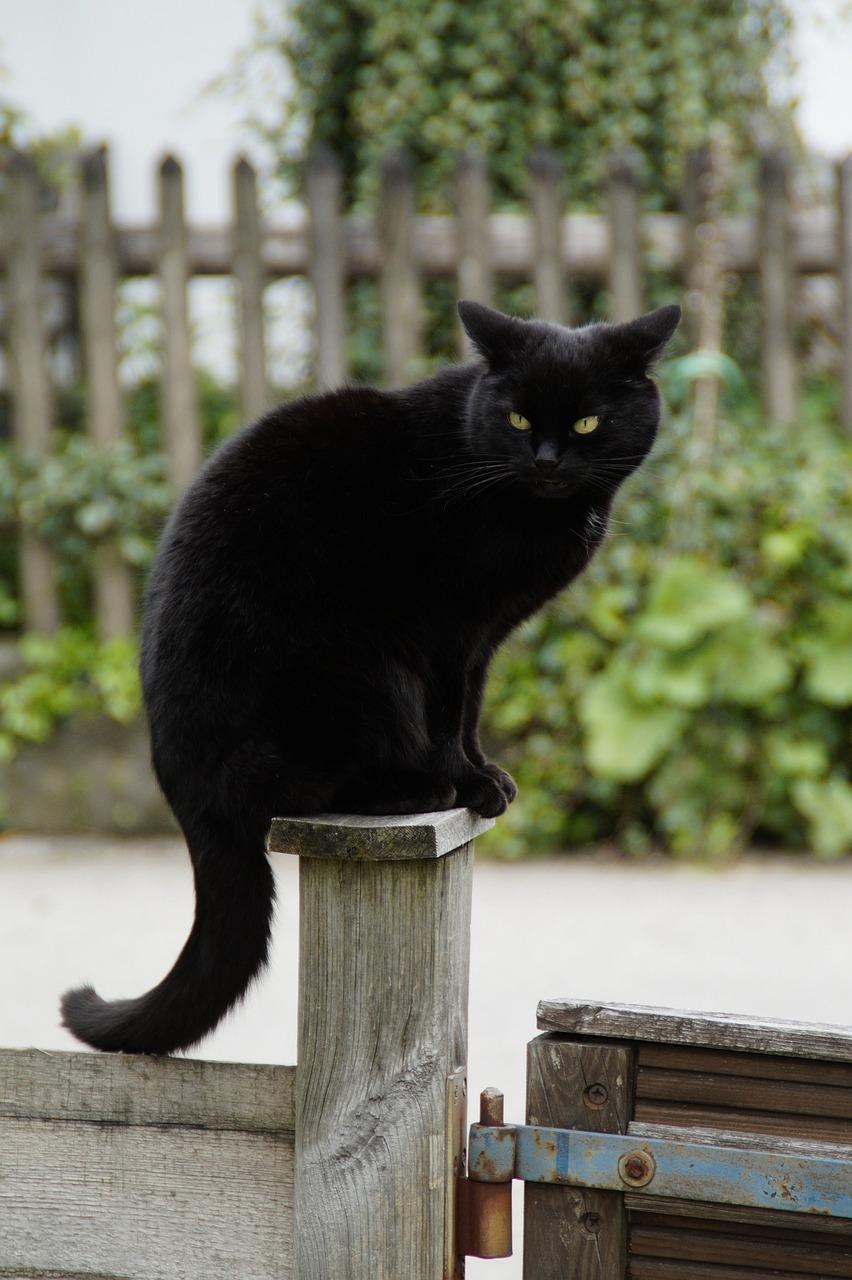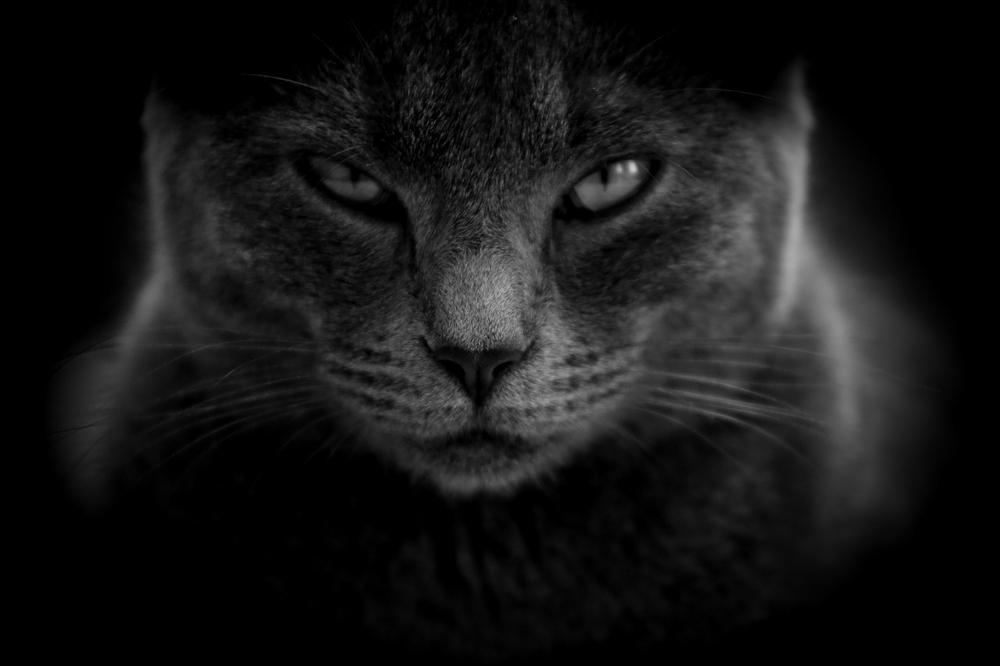Are Black Cats More Aggressive? Is It Just a Myth?

Here's the truth:
You've got this nagging fear in the back of your mind, don't you? 😟
The one that whispers, "Are black cats more aggressive?"
It's like a dark cloud hanging over your love for fluffy felines.
But let's dig deeper.
What if there really is a correlation?
What if these ebony beauties are bringing danger into your home?
Well, don't let that fear consume you.
In this I Care for Cats guide, I'll unveil the truth and put your worries to rest.
Let's face it head-on, shall we?
Let's find out if black cats are as menacing as they seem.
Are Black Cats More Aggressive Than Colored Cats?
While some people may perceive black cats as more aggressive, there is no scientific evidence supporting this claim. Certain fur colors may be statistically linked to aggression, but correlation does not imply causation. Overall, black cats are not inherently more aggressive than cats of other colors.
It's time to debunk the myth, folks.
Are black cats truly more aggressive than cats of different colors?
Well, it's not that simple.
Fur color may influence our perception of aggression, but hold on a minute before you jump to any conclusions.
There are a few things we need to consider here.
First of all, our own biases and beliefs can really mess with our judgment.
Some people subconsciously label black cats as aggressive due to cultural superstitions and negative stereotypes.
But let me tell you this - there's no scientific evidence backing up these claims.
However, there might be some statistical evidence that suggests a connection between fur color and aggression toward humans.

Interesting, right?
A survey found that certain types of cats, like female orange cats, black-and-white cats, and gray-and-white cats, tend to be more aggressive in everyday situations and even at the dreaded vet visits.
On the other hand, cats with fur colors like gray, black, white, or tabby seem to be calmer.
Now, I have to stop you right there.
This doesn't mean that fur color is the reason for aggression. And lest we forget, correlation does not equal causation.
Many factors can impact a cat's behavior, and black cats being aggressive might just be an old wives' tale.
So, let's set the record straight - black cats are not inherently more aggressive than cats with other coat colors.
Anecdotal stories about fiery black felines need to be taken with a grain of salt. The available information simply doesn't support these claims.
And remember, in case you're still curious, there's one more interesting topic I tackle in my blog post - are black cats smarter than other cats? If you want to gather information and opinions from experts, I highly recommend checking out Are Black Cats Smarter Than Other Cats.
It's an insightful guide that delves deeper into this intriguing subject.
Don't miss it!
The Role of Genetics in a Cat’s Behavior
Let's talk about genetics.
It's a big deal for cats.
You see how some cats have black fur, while others have stripes or spots?
Well, those colors are determined by genes.
And guess what?
Genetic factors also affect a cat's behavior.
Now, I know you're here because you want to know if black cats are more aggressive than cats with different fur colors.
But here's the thing:
Scientists aren't completely sure about the direct connection between specific genes and aggression in cats.
It's still a mystery.
So, we can't say for certain that black cats are more aggressive just based on their fur color.
What researchers do know is that genes influence a cat's overall temperament and personality traits, regardless of their coat color.
Genes shape a cat's behavior to some extent.
However, let's not rush to conclusions here.
A cat's temperament is influenced by various factors, so it's not solely determined by the color of their fur.
It gets even more interesting.
Evolutionary processes have influenced not only cats' coat colors but also other physical characteristics like tail and ear shape, as well as size.
And believe it or not—some of these changes have been linked to differences in tameness and aggression.
Yes, certain fur colors may be associated with a cat's tendency for aggression.
That's pretty mind-blowing, isn't it?
Here's a fun fact: Black cats can develop white fur as they age, similar to how humans get gray hair.
However, this doesn't mean that black cats are inherently more aggressive just because their fur may change color over time.
A cat's temperament depends on multiple factors such as breed, experiences, age, and health.
So, while it's fascinating to explore the role of genetics in a cat's behavior, we can't make broad generalizations about black cats being more aggressive based solely on their fur color.
Genetics certainly play a part, but they don't tell the whole story.
And now, let me shed light on the individuality and varied experiences that shape the behavior of black cats...
Understanding a Black Cat's Behavior
Black cats, like all other cats, have distinct personalities influenced by various factors.
Genetics, early socialization, past experiences, and interactions with their environment shape their behavior.
To debunk stereotypes about black cats, you need to understand their behavior and reveal their true nature.
Cats, regardless of color, have different personalities and ways of communicating such as rubbing against you, scratching furniture, or marking territory.
And guess what?

Black cats behave just like any other cat - fur color has no impact on their behavior. They can be affectionate, timid, aggressive, gentle, curious, or playful.
Some black cats excel at blending into their surroundings and are skilled hunters, like the Bombay breed, known for their black fur and sociable nature.
They can love, cuddle, adapt, be friendly, calm, and devoted to their owners.
Recognize that black cats, like other felines, display a wide range of behaviors.
They may demonstrate exceptional hunting skills or unwavering loyalty as protectors.
The key lies in their individual personality and experiences, which shape their behavior more than fur color. So, if you're concerned about black cats being aggressive or possessing mysterious qualities, fret not. Fur color has no connection to their personality traits.
Each black cat is as unique as any other cat; embrace them for who they are and enjoy the wonderful qualities they bring to your life.
Signs of Aggression in Cats
Recognizing aggression in cats is essential, as each feline has its own unique way of displaying it.
Hissing, growling, scratching, biting—it can all vary from one cat to another.
Body language can also be a key indicator of aggression.
Whether it's past experiences or traumatic events that trigger their aggression, it's crucial for owners to tackle these signs promptly.
By doing so, we can help our furry companions lead a more peaceful existence.
Understanding and recognizing the specific manifestations of aggression in your cat is vital for effective management.
So pay attention and take action—you hold the power to improve their quality of life.
Managing Aggressive Behavior in a Black Cat
When it comes to managing aggressive behavior in your black cat, positive reinforcement is key.
Here are some techniques to help you out:
- Rewards-based training is a great way to encourage good behavior and discourage aggression. Use treats or praise when your cat displays positive behavior.
- Consider trying clicker training. This method uses a clicker to mark desired behavior, followed by a reward. It can be effective in reducing aggression.
- Remember that each cat is unique, so not all cats exhibit territorial aggression. It's important to recognize the specific triggers for your black cat and address them accordingly.
- Avoid resorting to physical punishment. Instead, opt for positive reinforcement techniques that promote a more positive association with certain behaviors.
- In some cases, seek professional help from a veterinarian or animal behaviorist. They have the knowledge and experience to effectively manage aggressive behaviors.
Managing aggression in your black cat can be challenging, but with the right techniques and approach, you can create a happier and more harmonious environment for both you and your feline friend.
Remember, patience and consistency are key! 😺
The Role of Environment in a Cat’s Behavior
The role of the environment in a black cat's behavior is crucial.
Let's dive into the details:
- Early socialization is key. Exposing black kittens to various people, environments, and experiences during their early development stages promotes well-adjusted and nonaggressive adult cats.
- Breed influences behavior too. Different black cat breeds may have different temperaments and behaviors due to their genetic predispositions. For example, some breeds may be more energetic or affectionate than others.
- Socialization with other cats matters. Interactions with other feline companions help black cats develop proper social skills, leading to better behavior overall.
- Traumatic experiences can cause aggression. Stray and feral black cats, unfortunately, might display aggressive behavior due to past traumas and negative encounters with humans or other animals.
- Cultural beliefs impact black cats' reputation. In Japan, black cats are considered lucky, reflecting positive cultural attitudes towards them. However, misconceptions about black cats' aggression contribute to higher abandonment rates and lower adoption rates in some places.
- The rise of black cat cafes. Initiatives like Nekobiyaka aim to change negative perceptions and increase black cat adoption rates by showcasing their delightful personalities in a safe and welcoming environment.
Black cats thrive as indoor pets due to misguided beliefs.
By providing a loving home and dispelling myths, you can contribute to reducing shelter stays, illnesses, and euthanization rates for black cats.
So, create a positive and enriching environment for black cats, and you'll see their true loving nature shine through!
Ending notes
Summary takeaways:
- Aggression in cats may be correlated with fur color, but correlation does not imply causation.
- Fur color in cats can change due to genetic factors and evolutionary processes.
- A cat's coat color does not solely determine its temperament – other factors such as breed, experiences, age, and health also play a role.
- Black cats have diverse personalities and behaviors, contrary to stereotypical superstitions.
- Recognize and address signs of aggression in cats early on to promote a peaceful life.
- Positive reinforcement techniques are more effective than physical punishment in reducing aggression.
- The environment and past experiences significantly impact a cat's behavior, including black cats.
- Black cats face myths and misconceptions that affect their adoption rates and shelter outcomes.
- Efforts like black cat cafes aim to dispel myths and promote adoption.
- Black cats are predominantly kept as indoor pets to protect them from potential harm.
And that wraps up today's article.
If you wish to read more of my useful articles, I recommend you check out some of these: Do Cats Like Rain, Do Older Cats Purr More, Do Cats Understand Kisses, Do Cats Eat Their Own Poop, and Is Purring Involuntary in Cats
Talk soon,
-Sarah Davis